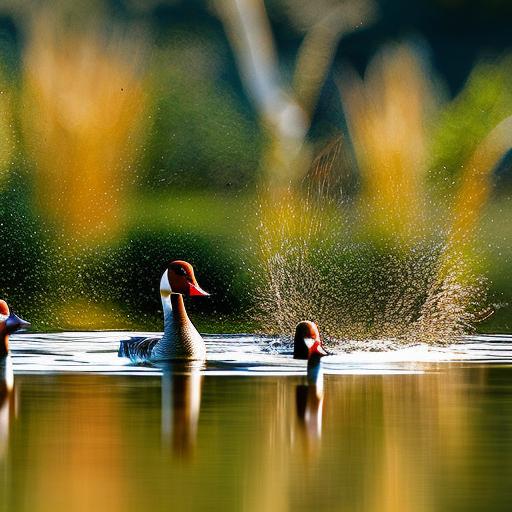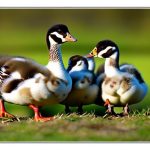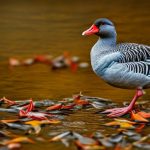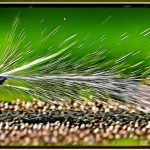Geese are often overlooked as potential pets, but they can be a wonderful addition to your pond. They are intelligent, social creatures that can provide entertainment and companionship. Geese are also great for ponds because they offer natural pest control and help fertilize the water. In this article, we will explore the benefits of raising geese in your pond, how to choose the right breed, setting up your pond for geese, feeding and watering them, caring for them during winter, health concerns and disease prevention, training and handling techniques, breeding and hatching tips, and harvesting and processing geese for meat and eggs.
Key Takeaways
- Keeping geese in your pond can be a fun and rewarding experience.
- Raising geese in your pond can help control algae and weeds, and provide natural fertilizer.
- Choosing the right breed of geese for your pond depends on your goals and preferences.
- Setting up your pond for geese requires providing adequate space, shelter, and water.
- Feeding and watering your geese requires a balanced diet and clean water sources.
Benefits of Raising Geese in Your Pond
One of the main benefits of having geese in your pond is natural pest control. Geese are excellent at keeping unwanted insects and weeds at bay. They will eat grasses, aquatic plants, and even small fish or insects that may be harmful to your pond ecosystem. This can help maintain a healthy balance in your pond and reduce the need for chemical treatments.
Another benefit of having geese in your pond is fertilization. Geese produce large amounts of droppings, which are rich in nutrients. When they swim in the water or walk around the edges of the pond, their droppings get distributed throughout the area. This natural fertilization can promote the growth of beneficial algae and plants, which in turn provide food and shelter for other aquatic life.
Geese also provide entertainment and companionship. They are social animals that enjoy interacting with their owners and other animals. They can be trained to follow commands and even perform tricks. Watching them swim gracefully in the water or waddle around the pond can be a source of joy and relaxation.
Choosing the Right Breed of Geese for Your Pond
When choosing a breed of geese for your pond, there are several factors to consider. Some popular breeds for ponds include Toulouse, Embden, and Chinese geese. Toulouse geese are known for their large size and calm temperament, making them a good choice for families with children. Embden geese are also large and have a friendly disposition. Chinese geese are smaller and more active, making them a good choice for smaller ponds.
Other factors to consider when choosing a breed include climate compatibility, noise level, and egg production. Some breeds are better suited for colder climates, while others thrive in warmer regions. If you live in a residential area, you may want to choose a breed that is known for being quieter. If you are interested in collecting eggs, certain breeds are more prolific layers than others.
Setting Up Your Pond for Geese
Before bringing geese into your pond, it is important to ensure that the environment is suitable for them. Geese require a pond of sufficient size and depth to swim and dive comfortably. The pond should be at least 100 square feet in size and have a depth of at least 2 feet. It should also have areas of shallow water where the geese can stand and feed.
Providing shelter and nesting areas is also important. Geese need a safe place to rest and sleep, especially during the breeding season. A simple shelter made of wood or metal can provide protection from the elements and predators. Nesting boxes or platforms should be placed near the water’s edge to encourage breeding behavior.
Fencing is essential to keep geese contained and protect them from predators. A fence should be at least 3 feet high and made of sturdy materials such as wire mesh or electric fencing. It should also be buried at least 6 inches into the ground to prevent digging predators from gaining access.
Feeding and Watering Your Geese
Geese have specific dietary needs that must be met for them to thrive. They require a balanced diet that includes a mix of grains, greens, and protein. Commercially available goose feed can provide the necessary nutrients, but it is important to supplement their diet with fresh greens and vegetables. Avoid feeding them bread or other processed foods, as these can be harmful to their health.
Water is also crucial for geese. They need access to clean, fresh water at all times for drinking and bathing. A pond or shallow pool can provide this, but it is important to monitor the water quality and ensure that it does not become stagnant or contaminated. Regular cleaning and maintenance of the water source is necessary to keep your geese healthy.
Caring for Your Geese During Winter
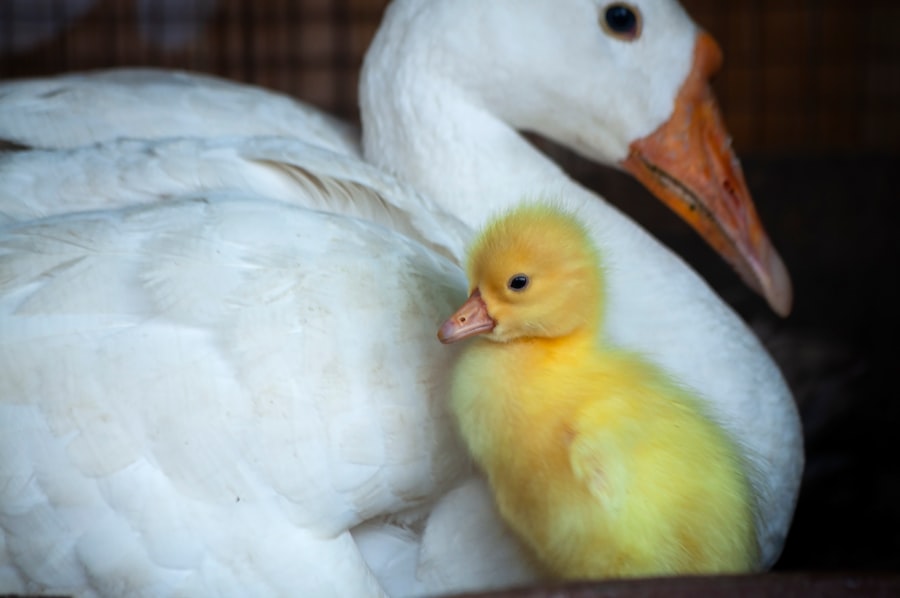
Winter can be a challenging time for geese, especially if you live in a cold climate. It is important to winterize your pond and shelter to protect them from extreme temperatures and harsh weather conditions. Insulating the shelter with straw or hay can help keep them warm, and providing additional bedding material can create a cozy nesting area.
Special considerations should be made for cold weather care. Geese need access to unfrozen water for drinking, so it may be necessary to install a heated water source or break the ice regularly. Feeding them a high-quality diet that is rich in nutrients can also help them stay healthy and maintain their body temperature.
Health Concerns and Disease Prevention for Geese
Like any animal, geese are susceptible to certain health issues and diseases. Common health issues in geese include respiratory infections, parasites, and foot problems. It is important to monitor your geese regularly for signs of illness or injury and seek veterinary care if necessary.
Preventative measures such as regular vaccinations, deworming, and proper hygiene can help reduce the risk of disease. Providing a clean living environment, regular grooming, and a balanced diet can also contribute to their overall health and well-being.
Training and Handling Your Geese
Training geese can be a fun and rewarding experience. Basic training techniques such as positive reinforcement and repetition can be used to teach them commands and tricks. It is important to be patient and consistent in your training efforts, as geese can be stubborn at times.
When handling geese, it is important to approach them calmly and confidently. Avoid sudden movements or loud noises, as these can startle them. It is also important to respect their personal space and avoid grabbing or restraining them forcefully. Building trust and establishing a bond with your geese through regular interaction and positive reinforcement can make handling them easier and more enjoyable.
Breeding and Hatching Geese in Your Pond
Breeding geese in your pond can be a rewarding experience, but it requires careful planning and preparation. Geese have a specific breeding season, which typically occurs in the spring. During this time, they will display courtship behaviors such as honking, head bobbing, and wing flapping.
To encourage breeding behavior, provide nesting boxes or platforms near the water’s edge. These should be filled with straw or other nesting material to create a comfortable environment for the female goose to lay her eggs. Once the eggs are laid, they will need to be incubated for about 28-30 days until they hatch.
Harvesting and Processing Your Geese for Meat and Eggs
If you are interested in harvesting geese for meat or eggs, it is important to do so humanely and responsibly. Geese should be slaughtered quickly and painlessly using approved methods. The meat should be processed promptly to ensure freshness and safety.
Eggs can be collected regularly during the breeding season. They should be handled carefully to avoid cracking or contamination. Proper storage and handling techniques should be followed to prevent spoilage or foodborne illness.
In conclusion, keeping geese in your pond can be a rewarding and enjoyable experience. With the right breed, setup, and care, geese can provide natural benefits to your pond while also serving as entertaining and affectionate pets. Whether you are looking for natural pest control, fertilization, or simply companionship, geese can be a great addition to your pond.
If you’re considering keeping geese in your pond, you may also be interested in learning about the best location for your chicken coop. Poultry Wizard has a helpful article on where to put a chicken coop, which provides valuable insights on finding the ideal spot for your feathered friends. Additionally, if you’re specifically looking for information on chicken coops in Muskegon, Poultry Wizard has another article dedicated to that topic. And if you’re curious about turkeys and whether they need a coop, Poultry Wizard has got you covered with an informative article on that as well. Check out these articles to ensure you provide the best living environment for your poultry.
FAQs
What are the benefits of keeping geese in your pond?
Geese can help control algae growth in your pond, provide natural fertilizer for plants, and add aesthetic value to your property.
What type of geese are best for pond keeping?
Domestic breeds such as Toulouse, Embden, and Chinese geese are popular choices for pond keeping due to their calm temperament and adaptability to different environments.
What should I feed my pond geese?
Geese should be fed a balanced diet of grains, vegetables, and protein sources such as insects or fish. It is important to avoid feeding them bread or other processed foods as it can lead to health problems.
How do I protect my pond geese from predators?
Predators such as raccoons, foxes, and coyotes can pose a threat to pond geese. Installing fencing or netting around the pond and providing shelter for the geese can help protect them from predators.
How do I maintain the cleanliness of my pond with geese?
Regular maintenance such as removing excess debris and monitoring water quality can help keep your pond clean with geese. It is also important to avoid overfeeding the geese as it can lead to excess waste in the pond.
Do geese require any special care or attention?
Geese require regular access to clean water, shelter, and a balanced diet. They also need to be monitored for any signs of illness or injury. It is important to provide them with a safe and comfortable environment to thrive in.
Meet Walter, the feathered-friend fanatic of Florida! Nestled in the sunshine state, Walter struts through life with his feathered companions, clucking his way to happiness. With a coop that’s fancier than a five-star hotel, he’s the Don Juan of the chicken world. When he’s not teaching his hens to do the cha-cha, you’ll find him in a heated debate with his prized rooster, Sir Clucks-a-Lot. Walter’s poultry passion is no yolk; he’s the sunny-side-up guy you never knew you needed in your flock of friends!

